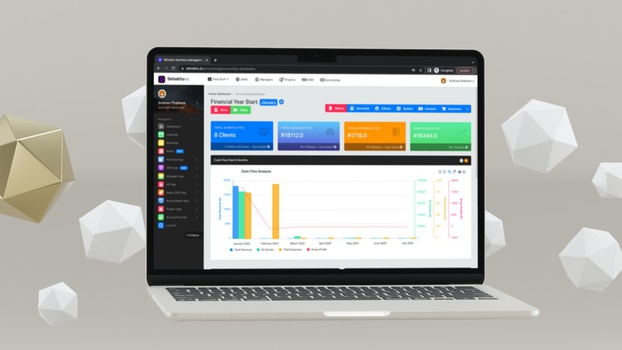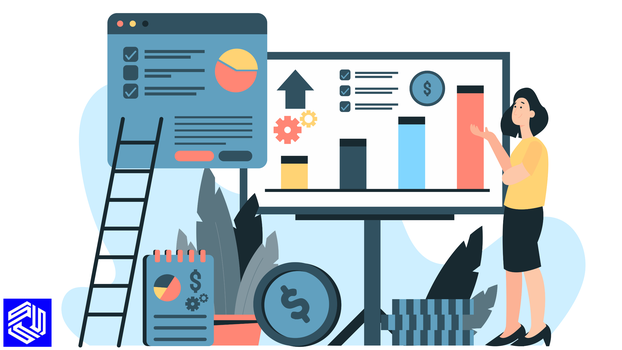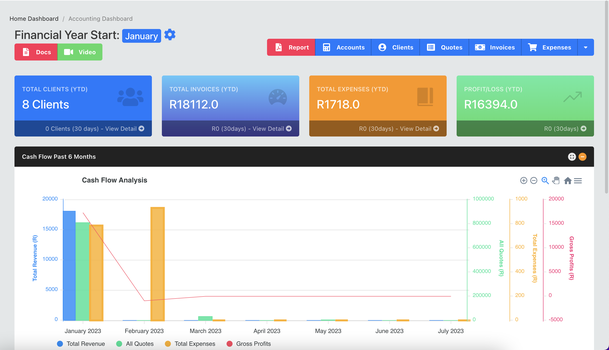The Role of Business Management Software in Financial Planning and Reporting
Financial planning and reporting are critical components of successful business operations. They play a pivotal role in guiding decision-making, optimizing resources, and achieving organizational objectives. Without effective financial planning and reporting, businesses can struggle to remain competitive, make informed decisions, and adapt to changing market conditions.
However, traditional manual financial management processes often present challenges. To overcome these obstacles and optimize financial operations, an increasing number of businesses are turning to innovative solutions - business management software.

This article delves into:
- Challenges in Manual Financial Management Processes
- The Role of Business Management Software such as Skhokho
- Streamlining Financial Planning
- Key Features of Business Management Software for Financial Planning
- Automation of Budgeting, Forecasting, and Financial Analysis
- Real-time Data Integration for Informed Decisions
- Enhancing Financial Reporting
- Simplifying Financial Reporting Processes
- Benefits of Centralized Data Collection and Reporting
- Reporting and Dashboards
- Improving Accuracy and Compliance
- Reducing Errors and Improving Accuracy in Financial Data
- Importance of Data Security and Privacy in Financial Management Software:
Challenges in Manual Financial Management Processes
Traditionally, many businesses relied on manual financial management processes, involving spreadsheets, paper-based records, and disjointed systems. However, these methods have several limitations and challenges that hinder the efficiency and accuracy of financial planning and reporting.
- Time-consuming: Manual financial management processes demand significant time and effort to compile, consolidate, and analyze financial data. This can lead to delays in obtaining crucial insights, impeding timely decision-making.
- Prone to errors: Human error is inevitable in manual data entry and calculations. Such mistakes can have severe consequences, affecting budgeting, forecasting, and overall financial health.
- Lack of real-time insights: With manual systems, accessing real-time financial data becomes arduous, preventing businesses from promptly identifying potential issues or opportunities.
- Inadequate data security: Physical records and spreadsheets pose security risks, as they can be easily lost, damaged, or accessed by unauthorized personnel.
- Limited scalability: As businesses grow and expand, managing finances through manual processes becomes increasingly complex and less viable.
The Role of Business Management Software such as Skhokho
To overcome the challenges associated with manual financial management, businesses are increasingly turning to business management software. This specialized software is designed to streamline financial planning and reporting processes, revolutionizing the way organizations handle their finances.

- Automation and Efficiency: Business management software automates various financial tasks, such as data entry, calculations, and report generation. This significantly reduces the time required to produce accurate financial reports and frees up resources for more strategic activities.
- Enhanced Accuracy: With reduced reliance on manual data handling, the risk of errors is greatly minimized. Financial data is consistently accurate, providing a reliable foundation for decision-making.
- Real-time Data and Insights: Business management software offers real-time visibility into financial data, enabling stakeholders to access up-to-date insights whenever necessary. This empowers businesses to respond quickly to market fluctuations and emerging opportunities.
- Improved Security: Advanced business management software ensures data security through access controls, and secure cloud storage, safeguarding sensitive financial information.
- Scalability and Integration: Modern business management software solutions are designed to grow with the business. They can seamlessly integrate with other systems, such as customer relationship management (CRM) and enterprise resource planning (ERP), creating a comprehensive business management ecosystem.
Streamlining Financial Planning
In today's dynamic business landscape, efficient financial planning is crucial for organizations to stay competitive and achieve their strategic goals. Business management software offers a suite of essential features that support financial planning, revolutionizing how businesses approach this critical process.
Key Features of Business Management Software for Financial Planning:
a. Comprehensive Data Management: Business management software provides a centralized platform to collect, store, and manage financial data from various sources. This streamlines data access and ensures data consistency, reducing the risk of errors and discrepancies in financial planning.
b. Customizable Budgeting and Forecasting: The software allows businesses to create customizable budget templates and forecasts tailored to their specific needs. Finance teams can set detailed budgeting parameters and create projections based on historical data, market trends, and anticipated business growth.
c. Advanced Financial Modeling: Business management software often incorporates powerful financial modeling tools. These tools enable scenario planning, allowing businesses to assess the impact of different business strategies and potential market changes on their financial performance.

Automation of Budgeting, Forecasting, and Financial Analysis:
- Automated Budgeting: Manual budgeting can be time-consuming and error-prone. Business management software automates the budgeting process, automatically populating budget templates with relevant data and making it easier to adjust figures based on changing circumstances.
- Streamlined Forecasting: With real-time data integration, business management software facilitates dynamic forecasting. As new financial data becomes available, the software automatically updates forecasts, providing stakeholders with the most up-to-date projections for better decision-making.
- Financial Analysis at Scale: Business management software employs powerful algorithms to analyze vast amounts of financial data quickly and accurately. This enables finance teams to identify trends, spot anomalies, and conduct deeper financial analysis to uncover valuable insights.
Real-time Data Integration for Informed Decisions:
Business management software facilitates real-time data integration by connecting with various systems within the organization, such as accounting, sales, and project app. This integration ensures that financial planners have access to the latest data from different departments, allowing them to make informed and timely decisions.
Real-time data integration also enables businesses to respond swiftly to market changes and adapt their financial plans accordingly. For instance, if sales performance exceeds expectations, finance teams can adjust revenue forecasts and allocate resources accordingly, optimizing financial outcomes.
Enhancing Financial Reporting
Accurate and transparent financial reporting is essential for businesses to communicate their financial performance to stakeholders, make informed decisions, and ensure compliance with regulatory standards. Business management software plays a crucial role in enhancing financial reporting processes, streamlining operations, and providing valuable insights to support business growth.

Simplifying Financial Reporting Processes:
Business management software simplifies financial reporting in various ways:
- Automated Data Collection: The software automates the collection of financial data from different sources, eliminating the need for manual data entry and reducing the risk of errors. This streamlined data collection process saves time and ensures data accuracy.
- Real-time Data Updates: With real-time data integration, financial reporting becomes dynamic and up-to-date. As financial data is constantly updated across the organization, the software reflects these changes in reports instantaneously, providing stakeholders with the latest information.
- Report Generation: Business management software offers pre-built report templates and customizable reporting features. Finance teams can easily generate a wide range of reports, including balance sheets, income statements, cash flow statements, and more, with just a few clicks.
Benefits of Centralized Data Collection and Reporting:
Business management software centralizes financial data, providing a single source of truth for reporting. This centralized approach offers several benefits:
Centralizing data ensures that all reports draw from the same dataset, promoting consistency and reducing the risk of conflicting information. With automated data collection and standardized reporting processes, businesses can significantly improve the accuracy of their financial reports, reducing the likelihood of errors. Centralized data collection eliminates the need to search for information across multiple systems, saving time and effort in the reporting process. During audits, having centralized and well-organized financial data simplifies the auditing process and increases confidence in the accuracy of the reports.
Reporting and Dashboards:
Business management software allows for customizable reporting templates and dashboards, empowering finance teams to tailor reports according to specific needs and preferences. Key benefits include:
- Visual Analysis: Dashboards provide visual representations of financial data, making it easier to interpret and identify trends or patterns quickly.
- Interactive Analysis: Customizable templates enable finance teams to drill down into specific data points, facilitating deeper analysis and understanding of financial performance.
- Executive-Level Reporting: Customizable dashboards allow for executive-level reporting, presenting critical financial insights in a clear and concise manner for strategic decision-making.

Improving Accuracy and Compliance
Accurate financial data and regulatory compliance are critical for the long-term success and reputation of any business. Business management software plays a vital role in improving accuracy and compliance by leveraging automation, standardization, and robust data security measures.
Reducing Errors and Improving Accuracy in Financial Data:
Business management software reduces errors and improves accuracy through several mechanisms: Manual data entry is prone to human errors, such as typos or miscalculations. Business management software automates data entry, minimizing the risk of mistakes and ensuring consistent and accurate financial data. By integrating real-time data from various departments and sources, the software ensures that financial reports reflect the latest information. This real-time approach helps avoid discrepancies caused by delays in data updates.
Importance of Data Security and Privacy in Financial Management Software:
Data security and privacy are paramount in financial management software to safeguard sensitive financial information from unauthorized access or breaches. Business management software addresses these concerns through various security measures:

- Encryption: The software encrypts data both during transmission and storage, ensuring that financial information remains secure and inaccessible to unauthorized parties.
- Access Controls: Business management software incorporates access controls, limiting access to financial data only to authorized personnel based on their roles and responsibilities.
- Secure Cloud Storage: Many modern software solutions employ secure cloud storage, which provides robust data protection and redundancy measures to prevent data loss.
- Compliance with Data Privacy Laws: Business management software adheres to data privacy laws and regulations, ensuring that financial data is handled in compliance with regional and international privacy standards.
Conclusion
Business management software plays a pivotal role in streamlining financial planning and reporting processes. It automates tasks, enhances accuracy, ensures compliance, and fosters collaboration, empowering finance teams to make data-driven decisions and align financial strategies with business objectives.
In light of the numerous benefits offered by business management software, we strongly encourage businesses to adopt these solutions for efficient and accurate financial management. By embracing technology-driven approaches, businesses can unlock their full financial potential, remain competitive, and navigate challenges with confidence.
By adopting business management software, organizations can revolutionize their financial planning and reporting practices, paving the way for improved financial performance and greater success in the ever-evolving business landscape. Make the leap towards a more agile, data-driven, and secure financial future by integrating business management software into your operations today.
Call-to-Action:
Are you ready to take your financial planning and reporting to the next level? Explore the wide array of business management software options available to streamline your financial operations and drive success in your business.
For a comprehensive and user-friendly solution, we recommend checking out the skhokho Accounting app. This powerful software is designed to simplify financial management, automate financial tasks, and provide real-time insights for data-driven decision-making. Click the link below to discover how skhokho Accounting can transform your financial processes:
https://skhokho.io/accounting-and-business-management-software









